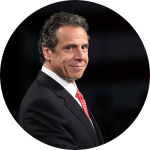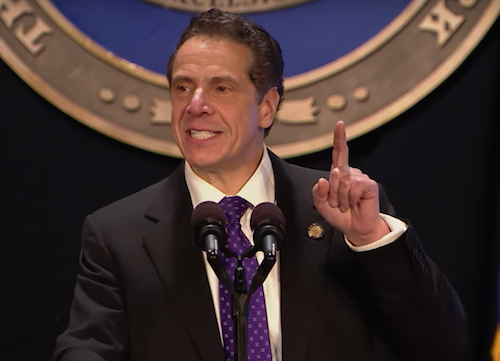Governor Andrew Cuomo delivered his eighth State of the State address today in what amounted to a laundry list of policy proposals woven into a larger repudiation of President Donald Trump and the 115th Congress.
Up for reelection next November, Cuomo painted New York as “the nation’s vanguard” of social progress and economic development against America’s national leaders in Washington.
Cuomo emphasized on the necessity to act in response to policies coming from Washington, as he proclaimed “This federal government is the most hostile and aggressive toward New York in history.”

The passage of the GOP tax legislation last month, for example, “Launched a full, all out, direct attack on New York’s economic future,” according to the second term governor. The bill would raise taxes on many New Yorkers across the state through, among other things, elimination of the state and local tax deductions that exceed $10,000. Believing the bill to be an unconstitutional assault on state’s rights, he vowed to sue the federal government, with the help of New York’s Attorney General Eric Schneiderman.
Yet despite the State’s tumultus relationship with the nation’s capital, Cuomo assured Albany’s lawmakers that New York would continue with his agenda, which he had rolled out over the previous month in preparation for Wednesday’s speech.
As the nation reckons with an awakening about sexual harassment and assault, Cuomo proposed several initiatives to reduce violence against women. No longer, for example, should tax dollars go to fund legal settlements against government employees, nor should those settlements be kept secret. Additionally, convicted domestic abusers would be barred from owning firearms, and perpetrators of revenge porn would face harsher penalties than the current law mandates.
Cuomo’s foray into the nationwide conversation on sexual harassment comes on the heels of a lawsuit by state government employee Lisa Marie Carter, who alleged Cuomo ignored harassment allegations against his appointed Empire State Development Corporation Regional President William Hoyt. The governor denies these allegations.
Cuomo’s 2018 priorities also include an overhaul of the state’s criminal justice system. Bail, he argued, should be required only for those who pose a serious flight risk or a danger to the public, ending a system that allows wealthier individuals to get out of jail, while poorer arrestees remain. He also criticized the extensive backlog of those awaiting trial for extended periods of time, singling out Akeem Browder, who brother Kalief commit suicide after three years in Rikers Island without being convicted.
One the subject of the state budgetary concerns, Cuomo argued for a continuation of investment in projects across the state, despite the projects $4 billion budget deficit.
In particular, the MTA subway system, which has experienced chronic problems since Hurricane Sandy in 2012, would need significant investment. Cuomo acknowledged the need to raise new revenue, possibly from congestion pricing in certain areas around the city. “These are difficult choices,” he noted, “but difficult choices do not get easier by ignoring them.”
In addition to fixing the problems with the subway system, Cuomo floated the idea of a subway line connecting lower Manhattan and Red Hook, an area he said needed improvements in transportation. Yet even in the absence of a costly new subwater subway, the Port Authority could improve movement around the Red Hook by relocating its shipping activities to the South Brooklyn Marine Terminal in Sunset Park, improving “community use” in the area.
Among the other projects in Cuomo’s priorities is the creation of a new arena for the New York Islanders in Belmont Park, Long Island. The team has played in Barclays center in Brooklyn since the 2015 NHL season. Yet as the Islanders leave the borough, Cuomo promised the creation of a new, 407 acre state park in Jamaica Bay, in the southern side of Brooklyn.
Throughout the speech, Cuomo advocated for additional investment to revitalize transportation hubs around the state, including the “suboptimal infrastructure” in Penn Station and at LaGuardia Airport.
He also touted his many environmental projects, aiming to make New York the nation’s leader on combating climate change. He spoke of his plans to expand the state’s wind power investment, allowing to renewable source to power 400,000 homes, and his desire to decarbonize New York’s Common Retirement fund, which controls $200 billion in assets. He also promised to sue the EPA, should they deems Hudson River PCB Dredging complete, in a decision expected to be passed down next month.
Cuomo, who has announced his intention to seek a third term this year, and who many suspect of harboring presidential ambitions come 2020, used the opportunity to trumpet the successes of his governorship. Not only is unemployment down in every part of the state, he proclaimed, but since 1942, “no administration has created more jobs, or a higher percentage of jobs, or created jobs faster.”
The governor concluded his eighth State of the State address with a call for national unity, noting the latin phrase “e pluribus unum,” or “out of many, one,” etched into the flag behind the Oval Office desk.
“To find the way forward, the president only needs to turn around.”






